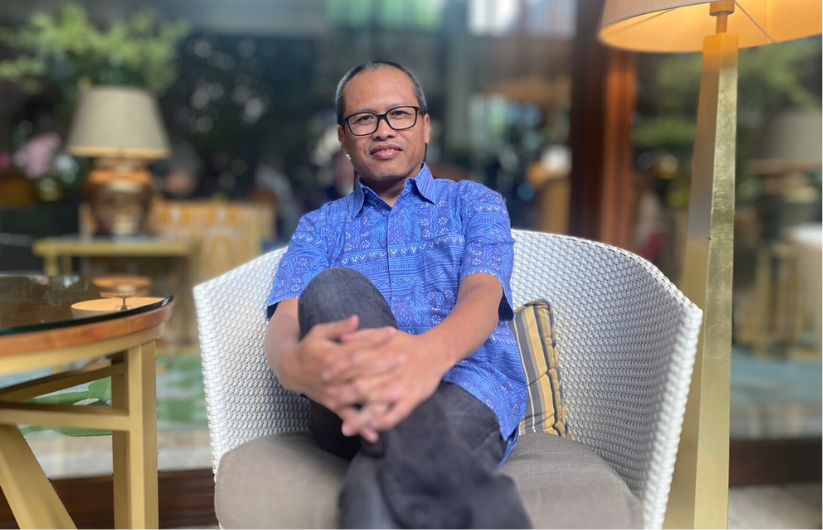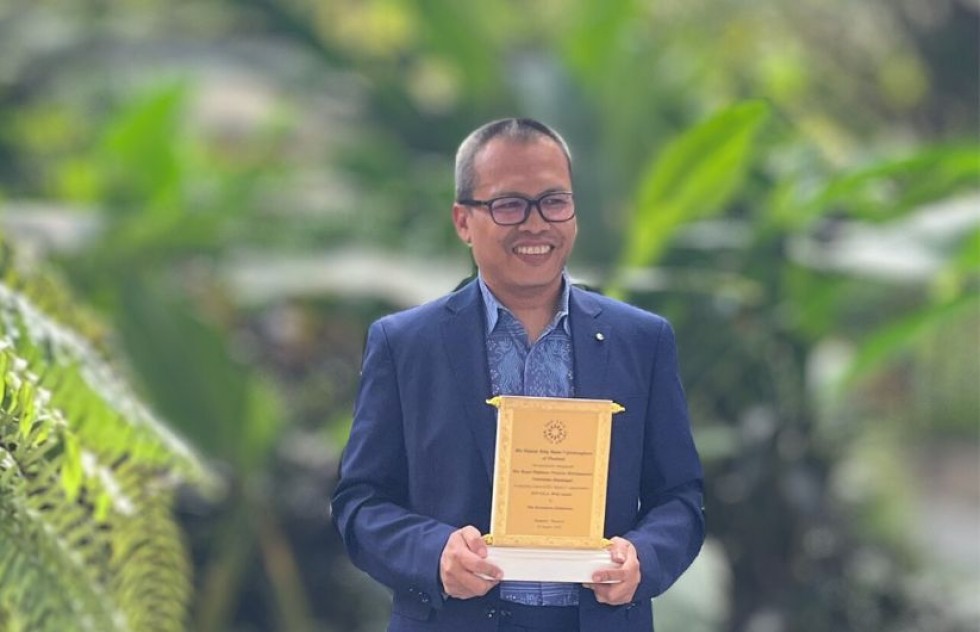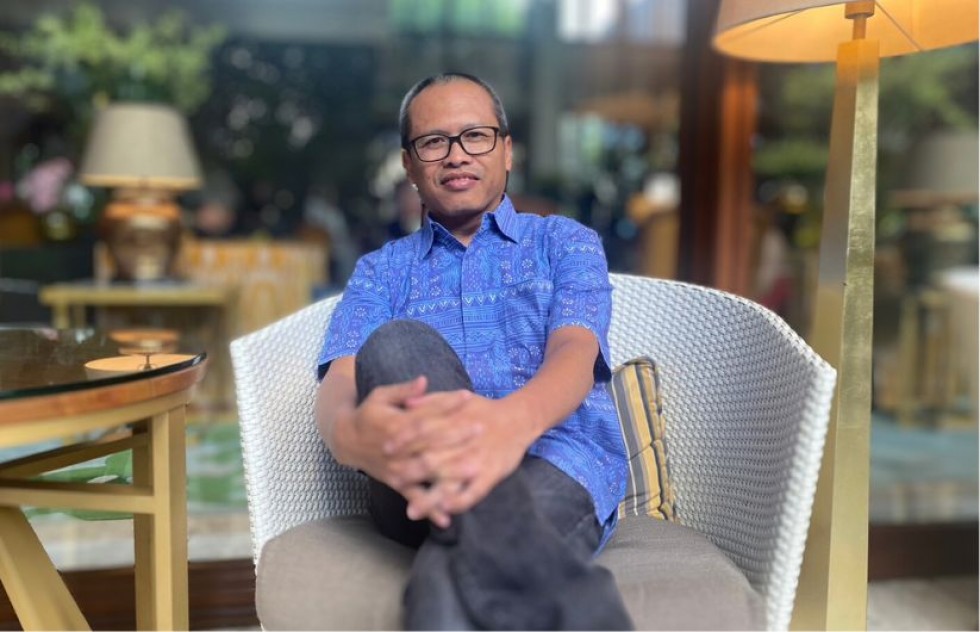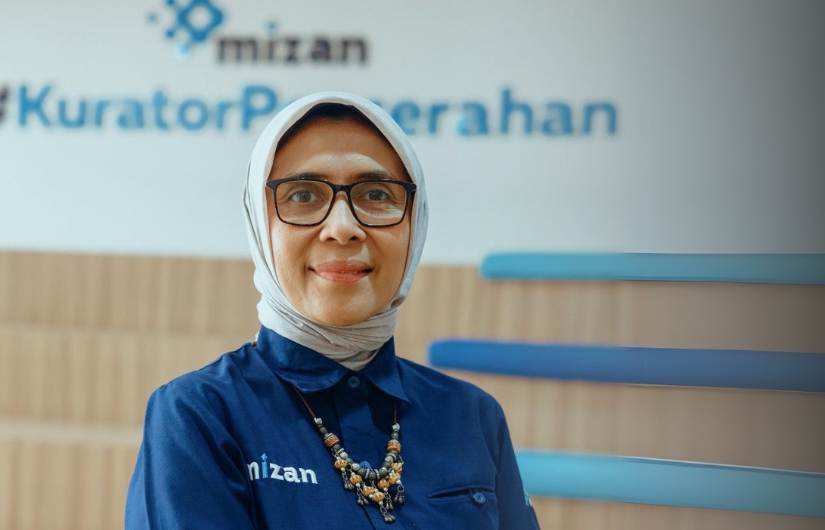Eka Kurniawan clinched the prestigious SEA Write Award 2019, sharing the laurels with fellow Indonesian luminaries Leila S Chudori (2020) and Yanusa Nugroho (2021). A profound moment indeed, and one that Elite+ Magazine was privileged to capture in an exclusive interview. Within the confines of a brief yet poignant exchange, Eka Kurniawan unveiled the extraordinary voyage that has marked his journey as an author extraordinaire. His expedition unfurls—a road that guided him from his dreamscapes to a prominent spot on the distinguished shortlist of The Man Booker International Prize in 2016.
A pinnacle reached, but the ascent did not halt there. Eka Kurniawan's literary legacy unfurls like the pages of a captivating novel, each chapter more enthralling than the last. Gracing the golden screen with the enchanting film "Vengeance is Mine, All Others Pay Cash." This cinematic gem garnered not just awards from Indonesian Film Festival but wins the Golden Leopard at the 2021 Locarno Film Festival.
Eka Kurniawan remains an embodiment of simplicity—a man with a fervent desire to pen what he perceives as truth and a voracious appetite to absorb the written word. We encounter the essence of a visionary who started with humble aspirations and evolved into an acclaimed luminary. The narrative of Eka Kurniawan is one that encapsulates the very essence of literature's magic—where the written word transforms lives.
First of all, congratulations for your award, SEA Write (2021) or (2019)? Your writing has been described as magical realism. How do you use this literary technique to explore complex societal issues in Indonesia?
Thank you. Yea, I was awarded in 2019 actually, so this year they invited us all finally, after lockdowns. At that time it was a sad year for Thailand, because the King (King Rama IX) had just passed away and everything in this country was mourning the death of the king at that time.
Hmm.. Magical realism! (sigh) I think critics often use the term, not me. But there's some truth to it and I agree in some way. In some of my works, I blend elements of magic and reality. So, why do we label it as magic realism? Well, in this sense maybe that's because there's a touch of folklore, mythology, and occasional fantasy woven into stories that are fundamentally grounded in realism. When I weave elements of folklore and fantasy into the fabric of reality, the result is something akin to magical realism.
Was that related or had anything to do with your studies in the past or your specific writers that actually amazed you or actually making you feel this is "it" or "this is the right thing that I want to write"?
I think it’s because I grew up in a circumstance that at that time we really loved to read popular genre novels, horror novels, detective stories and “Cerita Silat” and I like the idea of experimenting some combinations in my writing techniques. Well, sometimes there is crime and psychology, too, if we like to explore. For example, in one of my novels, I talked about a family, but it's also intertwined with Indonesian history. So, essentially, it's a story grounded in reality. However, I don't believe that the concept of magic realism applies to my other works or novels. Just like the authors or specific works that have deeply impressed you or have resonated with you as the perfect example of their genre. In my upbringing, I was surrounded by a multitude of popular genre novels—spine-chilling horror tales, captivating martial arts adventures, and intriguing detective mysteries. So, I decided to blend them all together, driven by my dear for each one. At times, there's a fusion of fantasy and reality, yet in a different realm, it's all about crime and the intricacies of the human mind. However, in alternate dimensions of my storytelling, like in my third novel "Vengeance is Mine," or in various other passages, I pay a tribute to the world of martial arts novels (especially in Indonesia). It’s more realistic and almost no fantasy there, except that of course the fighting scenes. So I think it came from my reading habit to read almost everything, so I’m influenced by all of them.
To elaborate more on your own specific interest on writing the martial arts, history and contemporary themes, how do you strike a balance between these elements and the urban jokes as you see in your storytelling?
Yeah, the balance is really important.. I have a kind of core idea that basically all is about the Indonesian, first of all. It's always about Indonesian people. And then there is like social criticism. But then I use the form of genre as kind of maybe, like seasoning food, you know. So, all this story about, for example, about the tug in the modern era, but at the same time it's kind of interesting to be read. So, how I can mix them with the martial arts, that's the big question in my head when I write the story. So, of course, the whole presentation of fighting, how much the presentation of it, I think I don't have something like that, but I use my sense when I wrote them.
Growing up during the New Order regime really shape how you see or write things. When you were a young kid back then and now as a well-known writer, you've got this treasure trove of history to tap into for your novels. But, did having a tough upbringing actually help writers?
Well, yeah, sometimes it did. I think I’m much influenced by the literary culture in that era. And how it affected my writing career is interesting too. Back in those days, the kinds of stories that were popular might have been a way for people to forget about all the politics going on. So we could find many entertaining materials at that time. Easy, you know, just some good entertainment to take their minds off things. Well, can’t deny, I grew up in that kind of situation and you know what cool is? It is how you've taken that upbringing and turned it into a tool for yourself. I mean, why not, right? You can tell stories that both entertain people and at the same time, make them think. It's not just about having fun, it's a way to get folks thinking about themselves, our society, and all the violence culture in that period, the messed-up stuffs that was happening back then.
But yes, I would like to also accept the way it was, and I would like to thank to that era too… that had made me this way. Because you know, back in the days, we were really hard to express ourselves, and all we could consume were really-really good entertainment stuffs, you know, the humor, naïve, horror and filled up with crazy imaginations sometimes.
So, you've kind of used these stories as a way to do two things at once. You're giving folks a good time, but also giving them a little nudge to reflect on stuff. And it's neat that you grew up surrounded by all this culture from the New Order era. It's like a unique advantage you've got. I perceive writing as a multifaceted instrument—one that can both captivate and provoke introspection. While I seek to entertain my readers, I am equally invested in encouraging them to reassess not only themselves but also the very fabric of our society.
Can you share your journey as a novelist from your early writing experiences to becoming a Booker Prize nominee? Elaborate your writing career in 3 stages, please?
(giggles)… I don't know, because sometimes I didn't expect myself to something like this. Never have I ever expected myself to receive the awards. From the Prince Claus award, to shortlist of Booker Nomination, to SEA Write Award you know. I just happened to write my first novel in the intention of writing something that I will love to read. Just that. I wanted to read and read it again, not just one time. That’s how I set my standard in writing. When I first wrote my first novel, of course, I just want to write something like what the things that I read. I read some popular books, mostly Indonesian prominent works, the world literary canon, so to say.
In my head, when I write something, it is always a combination of things that become my concern at a particular time, for example I want to see in my story that there is element of Dostoyevsky on it and there is some element of Abdullah Harahap and Kho Ping Ho at the same time, (giggles) so things that makes me enthusiastic about sitting on a chair and look to the computer for hours sometimes days. Because I want to create something that combines Abdullah Harahap and Dostoyevsky in my writing, I’m curious what will happen about this experiment, you know? I want to be playful on my own writing workshop. And outside of that, I don’t really think about any anything including the awards.
So I just ask myself, what kind of experiment would reserve you in your desk for a long time? For months working on it? That’s it. And when you find the answer, the rest is just how to finish it. And yeah, I just want to finish the work, you know. And then if I am lucky I can find a publisher who would want to publish it. And then If I am lucky there are readers out there who want to buy and read my stories. Hmm, there was this time when the book being published and the sales was not that good, well it happened to most writers as well. For me, it became the trigger to write more stories and more creativity. Then I will write another novel, hopefully a better one… So yeah, I’m this simple guy rarely think about big stuffs during the process in writing novels.
But after years passed, people started to recognize my novels. So, if we use your term “stage”. Came another “stage” in my life when finally, my books being published abroad and seeing them being translated into other languages. And then in Indonesia it became popular, some publishers reprint it a lot, and then after that, maybe the third “stage” would be the chapter when I received awards from here and there. (giggles)
Can you tell us about the significance of the SEA Write Award in terms of global recognition and it’s beneficiaries for you?
Let’s see the situation of Asian Literature first. I am very concerned about it because we are culturally very similar.. and politics, economics, and anything but not in literature because we read and we speak with very different languages. I think that this is something we don’t know how to deal with just yet. Because we can go anywhere here in South East Asia, and politically we are very connected, if you see like in football, we are competing with each other. But in term of literature, I can say that we are not reading each other. Like we lack of concern with each another, you know.
It's very different with Europe. Because people in France read Italian novels, and German read English novels and vice versa. But in South East Asia is something very challenging because the language is very different, and we have very little books translated to each other languages. So I think, SEA Write Award is very important to recognize each other’s country.
We need more steps to be familiar with each country’s literature. And this award is the only one literature award or project for all the writers from each country in ASEAN region.
As a prominent Indonesian Author, how do you see your role in representing Indonesia? Because in the literature world, you are among the popular figures in Indonesia.
I am afraid that I am not good enough to represent Indonesia or Indonesian literature because I think when I position myself in the Indonesian Literature Landscape, whoa, it’s really-really huge, broad. And when we talk about geographical regions in Indonesia, every authors from different island is very different from each another. So it’s hard to see that my work represent the whole Indonesian voices. Even the theme, the style… very broad.
Like for example, if people were asked what kind of Japanese literature that you like, the answer is always Haruki Murakami. And Kawabata. Because, simply, they are very popular, but I don’t think they represent Japanese literature. It happens too, in this case answering your question, that some people who wants to read Indonesian works, they refer my writings simply because my works are translated to different languages. And some foreigners read my works. And they started to have a glimpse of “oh this is kind of Indonesian literature” you know. As far as I can speak with the readers, I say to them so it’s just the beginning and you would want to read more Indonesian writers so you see more different kinds of writings. And it’s actually hard to debate which one is the better one, because you know, literature is something more to be judged in the way we see art. There’s always element of artistry on it, right? So, it’s hard to judge and debate about literary works.
Okay let me elaborate my question, you mentioned that you read a lot of pop stuffs during the New Order regime, and you graduated from one of best university in Indonesia, Gajah Mada University from Philosophy Department. What made you choose to write?
I think it’s too naïve if I say I want to become writer because of other writers. I want to be like Ko Ping Ho or… I want to be like Chekov or whoever… you know. I think when we were a teenager, we used to be like that, sometime we want to be what we liked! And sometime our dreams may change along the way, you know.. sometimes I want to be like Axl Rose or… (giggles) but then again, I started to read a lot and I started to write and it crafted my paths.
And yeah, I do agree that my studies in Philosophy have helped me a lot in this writing career path. It made me realize that to write something is to record something, because, you know, human tends to forget anything easily, while we know that our brain is very big, but most of them is useless because we tend to remember just a little. So why we human start to write, I think because we want to remember and record things, on the stones, on the trees, and then on the paper and ink. And then Guttenberg came with technology of printings, and then in the internet. I think all of them is very similar, it’s created because we want to read again our experience, our ideas, our creations and most of the time our own imaginations. So practically, I want to write because I want to remember things.
And thirdly, after the naïve motifs, all of the people nowadays make recordings of their life through camera, post on social media, use different tools to store our collective memory. So the challenge is how my writings can be in the hearts of other people? Because everybody is writing the same things, record the same things, we can see as like competing each other, you know, for me the answer is just being creative. So for me as simple as that, just being creative more and more each days, hopefully people appreciate your works, and can make money, and yea at least people read it.
We noticed your speech most of the time, that being a good writer is not being someone who think outside the box, being a good writer is being someone inside the box, but you should make the box bigger and bigger each day. Can you elaborate this testament?
Yes, I rewind it most of the time when I need to speak with younger writers or creative communities or readers, I think it’s very simple, for me it is easier that I write something that I know, but if I don’t know it’s harder. So for me to be a good writer is someone who is actively making his inside world (or this box) as bigger as we want to. We don’t need to go outside the box or maybe if we see the box as our limitations, then we have to expand this box, make it larger. For example, if you have a friend, that I never see, you just tell me that this friend is like this this and this. I still don’t know about him or her. I cannot say anything about his or her because I have lack of information or maybe It doesn’t concern me. What I can tell is you, everything about you that I know about very well. So, for me, that’s the box. The box is where our experiences, our knowledges and our imaginations lied. So that’s the box. You can’t speak something if you don’t know about, right? If I want to speak about Thailand’s history, I have no knowledge or very little knowledge about that, how do I write?
In the spotlight of Eka’s literary achievement, "Vengeance is Mine, All Others Pay Cash," which successfully transitioned to the golden screen with a star-studded cast and even garnered recognition at Locarno, the integration of diverse emotions—humor, tragedy, and absurdity—stands out as a hallmark of his craft. Reflecting on the creation of this work, Eka shared Elite+ his recalls, how it marked a significant juncture after his first two novels. These initial works grappled predominantly with themes of sexuality, each approached from distinct angles. While the first novel explored into sexual violence within a political context and the second explored familial violence, both prominently featured female protagonists. During this phase, infusing humor into these themes seemed challenging, as making people laugh with his words proved elusive.
Your work “Vengeance is Mine, All Others Pay Cash” (and as movie it was directed by Edwin) was a huge hit as it was made into movie starring many popular actors and won an award in Locarno Film Festival. It was full of humor, tragedy and sometimes absurdity. How do you navigate between these contrasting emotions like, do you remember how work on that piece of writing, like different things in your previous novels.
I wrote that after my first and second novel, you know. And I think I came to the point where I realize that playfulness is my key to break down any challenges in writing a novel. I treat my first three novels, which dealt with, most of the time, dealing with sexuality, in each different theme. The first one is sexual violence in political scene, second novel was about violence in the family. But the first and the second novel were central on woman character. So at that time when I wrote my first and second novel, I don’t think I could write humor as free as I wanted to, you know. It's hard for me to make people laugh with me with my words.
So came the time when I wrote “Vengeance is Mine”. Of course, the way I treat my third novel was different. I wrote about a young boy with difficulties in erection, you know. And I just wanted to mock and made a vibrant jokes around this “oppressive image” on masculinity. I started to question about masculinity, how does it oppress us the males. Is it toxic too? (Laugh out loud).
The settings of your novels often become characters in their own right, shaping the experience of the protagonist, how do you use the environment to amplify the emotional impact of your narrative?
It’s very important to harmonize the setting, the characters, and the descriptions because I used to think that narrative is like you drive a car, is always moving. So of course, it has to move forward, what’s happening when you drive in the middle of the way, do you have to stop for a while to enjoy the scenery or you have to stop because there is a big traffic jam, you know. The stop makes you see your surroundings in detail, right? That’s how I see what narratives is. But if we move on and on, without stopping, it is also very tired, no? Sometime I take a stop, recreate other scenery which is a little bit more comforting, to see clearly, what is actually in there, inside the character, so at the same time it will help us to make the character rounder (solid), so we cannot only hear from the character’ point of view but where he/she stands or sits. Because let me put it this way, like for us, if we do this interview with beer is very different with doing it with coffee, you know. Simple things may change the whole lot of the ambiance, people’s feelings and other important elements in the story.
Now give our time a little bit to talk about "Man Tiger", what do you see the strength on this book when the judges of Booker Prize see it as a prominent work and worth evaluating?
To be honest, I don’t know what makes the novel interesting or worth to be valued. (giggles) I wrote it as a response of my first and second novel, which were very thick for me, and also heavy in content you know, the theme, a lot of characters, a lot of mixed genres there.
So, I wrote the third novel with the idea of “...oh... I want to make it simple, with a simpler theme, about the crime committed by a boy" you know… in just story about two families, and very complex, no more than 200 pages. I don't know (Laugh out loud) … Maybe they (the jury) just liked it? (Laugh out loud) (sigh) (smirked)
Last question, what do you want to say as a closing statement for your win, and also for our readers in Thailand or ASEAN here?
Hmm… I want to see people in the ASEAN read more about other writers in the neighboring countries you know… I want to see in the future, many writers from our country write about maybe Thailand, or the Philipines will write about Singapore or Malaysian writers will write about Vietnam, you know. Let us begin to see this map as somewhat a cultural and mind map too. You know the reality is like, we live in a housing complex, but we don’t know anything about our neighbors you know. We simply don’t understand each other.
I think to understand each country better is from literary works. Because when we read only from the news, with the actuality and real time style, it’s really fast and it became only knowledge, without reflection left. It’s different if compared to reading literature form. We can understand deeper.
And with the literature format, we can read about Thailand for example, their history become novels and we see something as still relatable to our times today, through literature. And you give voice to one character, one person in your creation, very subjective point of view, of course, but at the same time you have the chance to store longer in the writings, no more as a data or information only, but it’s something deeper than that. Just because it’s very subjective. About one kind of person as the main character, maybe it can be about rich person or maybe a beggar. Anything can happen in literature.. That’s it.
Eka Kurniawan eloquently underscores the profound importance of intercultural literary exploration within ASEAN countries. He envisions a future where the boundaries between nations are bridged through literature, where writers from one country explore into the stories of another. Drawing a powerful analogy, he likens the current state of affairs to living in a housing complex without truly knowing one's neighbors. This lack of understanding, he suggests, can be remedied through the pages of literature, which offer a nuanced perspective beyond the immediacy of news. Literature, according to Eka Kurniawan, allows for a deeper comprehension of a nation's history, and through the lens of novels, those histories become relatable, resonating across temporal boundaries. By embodying characters from various walks of life, literature captures the essence of subjectivity, presenting a comprehensive portrait. Eka Kurniawan's words inspire a vision of a united ASEAN, where cultural and intellectual connections enrich the shared landscape.























































































































































































































































































































































































































































































































































































































































































































































































































